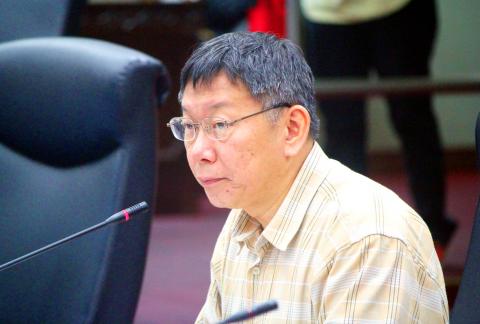If Beijing does not order the release of human rights advocate Lee Ming-che (李明哲), “problems will arise” when the Chinese delegation arrives in Taipei for the Summer Universiade in August, Taipei Mayor Ko Wen-je (柯文哲) said.
China’s handling of the Lee incident is “strange” and “runs counter to global norms,” Ko said in an interview published yesterday by the Chinese-language Liberty Times (the Taipei Times’ sister newspaper).
Ko said he had no preconceived notions about Lee’s arrest almost three weeks ago, but Beijing should have disclosed on what grounds it detained him and allowed his family to visit on the second or third day of his detention.

Photo: CNA
“This is the way of civilized nations,” he said, adding that he was concerned about China, as a superpower, demonstrating behavior that is at odds with the civilized world.
China’s handling of the Lee case provided insight into why, despite all the benefits that China’s Taiwan Affairs Office has offered Taiwanese businesspeople in China, there is still a general antipathy toward China among Taiwanese, Ko said.
“It is very simple. The Chou Tzu-yu (周子瑜) incident probably scared off half of Taiwanese, while the Lee Ming-che incident scared off the other half,” Ko said, refering to a seemingly forced apology by the Taiwanese K-pop idol after she displayed a Republic of China flag on a South Korean TV show last year.
“Maybe they do not find it unusual, but to Taiwanese it was beyond shock and awe,” Ko said, adding that the two incidents showed a fundamental difference between Taiwanese and Chinese beliefs, which is an issue Beijing should be mindful of.
As China plans to send a delegation of at least 700 to Taipei to compete in the Summer Universiade, problems will arise if Beijing does not handle the Lee incident with caution, Ko said.
Ko said that although Taipei’s extensive experience with dealing with protesters is enough to guarantee the safety of Chinese delegates, he cannot control public sentiments toward the delegation.
“Who do you think spectators will root for if China and US went head-to-head in a match?” he asked.
Taiwanese attitudes toward the Chinese delegation would have a profound political effect on Beijing and the world through live broadcast of the Games, he said.
Asked what messages he would convey to Chinese President Xi Jinping (習近平) if he meets Xi’s aides on his trip to China for the Taipei-Shanghai Forum in June, Ko said that it is unclear whether he would meet with them.
If he has a chance to meet with Beijing officials, he would urge China to respect “universal values and global norms” in addition to promoting exchanges across the Taiwan Strait, so that disagreements can be resolved by an increase in goodwill, Ko said.

NATIONAL SECURITY THREAT: An official said that Guan Guan’s comments had gone beyond the threshold of free speech, as she advocated for the destruction of the ROC China-born media influencer Guan Guan’s (關關) residency permit has been revoked for repeatedly posting pro-China content that threatens national security, the National Immigration Agency said yesterday. Guan Guan has said many controversial things in her videos posted to Douyin (抖音), including “the red flag will soon be painted all over Taiwan” and “Taiwan is an inseparable part of China,” while expressing hope for expedited “reunification.” The agency received multiple reports alleging that Guan Guan had advocated for armed reunification last year. After investigating, the agency last month issued a notice requiring her to appear and account for her actions. Guan Guan appeared as required,

A Vietnamese migrant worker yesterday won NT$12 million (US$379,627) on a Lunar New Year scratch card in Kaohsiung as part of Taiwan Lottery Co’s (台灣彩券) “NT$12 Million Grand Fortune” (1200萬大吉利) game. The man was the first top-prize winner of the new game launched on Jan. 6 to mark the Lunar New Year. Three Vietnamese migrant workers visited a Taiwan Lottery shop on Xinyue Street in Kaohsiung’s Gangshan District (崗山), a store representative said. The player bought multiple tickets and, after winning nothing, held the final lottery ticket in one hand and rubbed the store’s statue of the Maitreya Buddha’s belly with the other,

‘NATO-PLUS’: ‘Our strategic partners in the Indo-Pacific are facing increasing aggression by the Chinese Communist Party,’ US Representative Rob Wittman said The US House of Representatives on Monday released its version of the Consolidated Appropriations Act, which includes US$1.15 billion to support security cooperation with Taiwan. The omnibus act, covering US$1.2 trillion of spending, allocates US$1 billion for the Taiwan Security Cooperation Initiative, as well as US$150 million for the replacement of defense articles and reimbursement of defense services provided to Taiwan. The fund allocations were based on the US National Defense Authorization Act for fiscal 2026 that was passed by the US Congress last month and authorized up to US$1 billion to the US Defense Security Cooperation Agency in support of the

CLASSIFIED BRIEFING: The ministry said the special budget focuses on building a comprehensive defense system and strengthening the domestic defense industry The Ministry of National Defense yesterday released information on seven categories of weapons systems to be procured under a stalled NT$1.25 trillion (US$39.57 billion) special defense budget, including precision artillery, long-range missiles, air defense anti-tank missiles and more than 200,000 uncrewed aerial vehicles (UAVs). The Executive Yuan approved a draft version of the budget on Nov. 27 last year and submitted it to the legislature for review. The legislature’s Foreign Affairs and National Defense Committee yesterday invited Minister of National Defense Wellington Koo (顧立雄) to deliver a classified briefing and answer questions at a closed-door session. Koo said he hoped to provide lawmakers